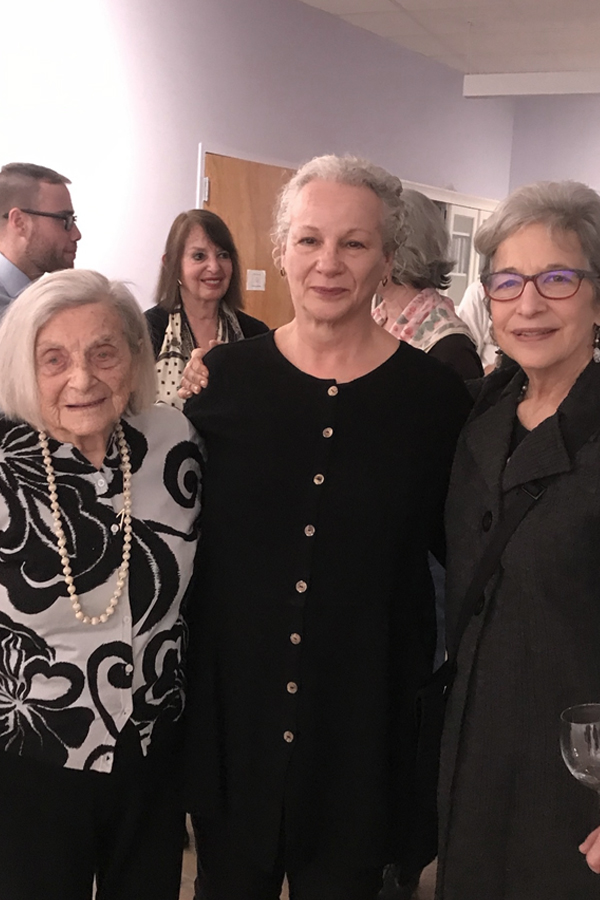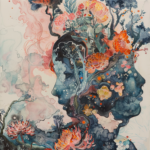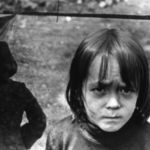
Anni Bergman (left), Sally Moskowitz (center) and Rita Reiswig (right)
CIPS NewsBriefs - Spring 2022
In Memoriam
Anni Bergman, PhD, FIPA
Remberance offered by Sally Moskowitz, PhD, FIPA and Rita Reiswig, LP, FIPA
Anni Bergman died on October 2, 2021 at the age of 102. She was born in Vienna and at age 19 emigrated to California where she became part of a group of young musicians and students studying with Arnold Shoenberg at UCLA. She supported herself by living as an assistant and companion to the psychoanalyst Christine Olden with whom she remained life-long friends. In 1943, she completed a BA in Music and Early Childhood Education and moved to New York City with her husband to be, Peter Bergman. Anni taught recorder and piano and with Florence White, wrote Playing the Recorder, a book still in print. Over the next years, two children, Kostia and Tobi were born.
In 1959, Anni interviewed with and was given a position by Dr. Margaret Mahler who was beginning her research at the Masters Children’s Center. Working with Drs. Fred Pine, Manuel Furer, and John McDevitt, Anni assisted in making observations of the children in the two nurseries at the center. One nursery, for “normal” toddlers and their mothers, was designed in an informal way so that the comings and goings between child and mother could be observed as they occurred naturally over the course of the day. In the second nursery designed for autistic and psychotic children, therapists conducted intensive work with mother and child together. Dyadic psychotherapy was unique, if not unknown, at the time. Anni was involved in both projects, recording notes and theorizing on the separation-individuation process, and also working therapeutically with the autistic children and their mothers, helping them establish a close bond from which they could then navigate the intrapsychic processes of separation-individuation. The research continued for more than a decade and culminated in the publication in 1975 of the groundbreaking and seminal book The Psychological Birth of the Human Infant, co-authored with Margaret Mahler and Fred Pine.
Anni continued her work with autistic and psychotic children and in 1978, with Drs. Gilbert Voyat and Linda Gunsberg co-founded and directed a therapeutic nursery for preschool inner-city autistic and psychotic children. The project which ran from 1978 through 1984 was endorsed and housed by the City College Clinical Psychology Program. The therapeutic nursery utilized the frameworks of separation-individuation theory and Piaget’s cognitive stage theory. The nursery was staffed by Bank Street trained teachers. Doctoral students in Clinical Psychology provided intensive, three times weekly treatment of child and mother together, and individual treatment for mothers. Masters and PhD level students worked as therapeutic companions for the children, bridging their worlds beyond home and the nursery. Many PhD theses and publications came out of this very important work.
In 1983 Anni received her PhD in clinical psychology from the City University of New York. Dr. Steven Ellman served as her dissertation chair and later co-authored with her two chapters on separation individuation theory. Anni was invited to become Faculty and Supervisor at the Postdoctoral Program at New York University and IPTAR, and Faculty, Supervisor and Training Analyst at the Contemporary Freudian Society. She also has been a special member of the Columbia and White Institutes and a Visiting Faculty member in the Clinical Psychology Program at the University of Padova. She has been a long-time active Board member of the Margaret S. Mahler Child Development Foundation. She contributed to many committees and for several years co-chaired the conference committees of CFS and of IPTAR with Dr. Carolyn Ellman, bringing analysts from around the world to speak on innovative topics.
In 1997, as an outgrowth of a Contemporary Freudian Society study group on the emerging work and literature on infant development and parent-infant treatment, Anni and Rita Reiswig launched the Three-Year Training in Parent-Infant Studies, a course of study built on the foundation of infant observation, theories of infant development, and parent-infant treatment. In 2006, the Institute for Psychoanalytic Training and Research joined the Contemporary Freudian Society as a co-sponsor of the program and Sally Moskowitz joined as one of the co-directors. At that time, the program was also renamed the Anni Bergman Parent-Infant Training Program to publicly acknowledge and honor the influence of Anni’s contributions to the field of psychoanalytic work with parents, infants, and young children. Anni continued to be active teaching in the program until 2016.
During this same period, soon after the attacks on the World Trade Center, Drs. Beatrice Beebe and Phyllis Cohen conceived of a project to find and work with mothers who were pregnant and widowed on September 11th and the babies born to them. They gathered a core group of therapists that included Anni, Dr. Donna Demetri Friedman, Dr. Sally Moskowitz, Rita Reiswig, Dr. Mark Sossin and Dr. Suzi Tortora and with them developed a model of working with traumatized and grieving mothers and their babies in mother/baby groups and individually, using video feedback of mother/baby interaction. The Mothers, Infants, and Young Children of September 11, 2001 Project describes this work.
Also during this time, around 2005, Anni began working with Dr. Miriam Steele and Dr. Steele’s then graduate student Dr. Inga Blom on a follow-up study of children who had been in the Masters Children’s Center, that required an integration of separation-individuation theory and attachment theory. Subsequently, they all collaborated with Dr. Wendy Olesker, who had been involved in previous follow-up work with the Mahler subjects along with Dr. John McDevitt. Together, Drs. Bergman, Blom, Olesker and Steele focused on bridging those two theories in light of contemporary attachment research and ongoing longitudinal data collection, and wrote and presented annually on the continuing theoretical and clinical relevance of Dr. Bergman’s early work with Margaret Mahler.
Anni’s influence has been widespread over many generations of patients, students, supervisees, and the field of psychoanalysis. She is beloved and revered by colleagues throughout the world for her warmth, keenly sharp and open mind, and her capacity to see hope and joy in the darkest places. She presented papers around the world and brought lecturers to New York, helping to further the psychoanalytic study and discussion of infancy and developmental processes. Throughout her long career, she grew with psychoanalysis, always embracing new ideas and integrating them into the old. Her mind was creative and capacious able to bridge the worlds of research, intrapsychic processes, and various theoretical orientations.
“… music is also a kind of language… even when I started to be a therapist, I still used singing as an important way of communicating…. Sometimes I could sing interpretations more easily than say them (p. 235, Cohen, 2008).






